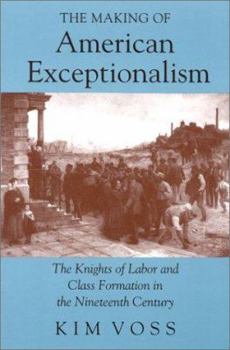The Making of American Exceptionalism
Select Format
Select Condition 
Book Overview
Why has the labor movement in the United States been so weak and politically conservative in comparison to movements in Western Europe? Kim Voss rejects traditional interpretations--theories of... This description may be from another edition of this product.
Format:Paperback
Language:English
ISBN:0801481198
ISBN13:9780801481192
Release Date:January 1994
Publisher:Cornell University Press
Length:310 Pages
Weight:0.95 lbs.
Dimensions:0.8" x 6.0" x 9.0"
Customer Reviews
1 rating
A new theory of American Exceptionalism
Published by Thriftbooks.com User , 24 years ago
As noted in the book description, the author offers a new theory of the development of America's distinctly conservative labor movement. The book admerably combines historical case studies and a statistical review of the formation and collapse of Knights of Labor locals in the New Jersey. Both of these methods reject a view that America was somehow fundimentally different than Europe (France and England are used for comparison) prior to the collapse of the KoL. Further, she does not find evidence for the typical explinations of the Knights' failure such as craft conservatism, ethnic diversity, industrial diversity and middle class influence. Rather, she finds that the main cause of the Knights' decline was employer opposition, which she found to be much more profound than in ENgland or France, coupled with the lack of an activist government. These conclusions are well supported by her evidence, however, her most interesting assertion is also the least well argued. She points out that even strong employer intransigence cannot fully explain the fall of the Knights, as both English and French unions suffered significant numnerical setbacks in this period. However, those unions rebounded and the Knights did not. The author argues that the Knights' ideology cast the blame for their failures fully onto their own organizations, which left little ideological space for recovery. This argument, with its emphasis on the from of organizational conciousness is provocotive, but requires additional supporting evidence. Overall, an important and thoughtful book on a long standing topic in American Labor History. And for those who don't with to slog through the statistical analysis, parts one and three provide a thoughrow introdustion, overview and conclusion.






